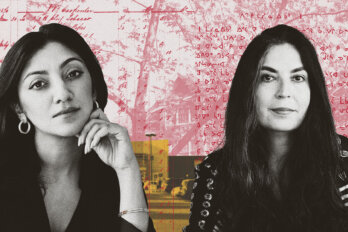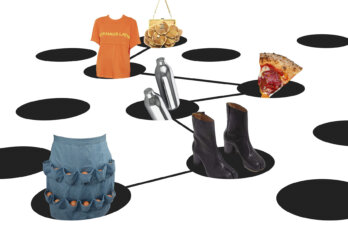Women have long played supporting roles to great literary men. Tolstoy’s wife, Sophia, edited his manuscripts; Milton had his daughters transcribe parts of Paradise Lost; Véra Nabokov did everything for Vladimir and also rescued Lolita from the trash more than once. Véra and Sophia set aside their own writerly ambitions to serve their husbands; Milton exploited and neglected his daughters. Tabitha King convinced Stephen to salvage Carrie, launching his career, later enduring his habit of playing “Mambo No. 5” around the clock. Many readers would likely argue the resulting works justify their sacrifices and suffering. But Daughter, Claudia Dey’s wry, furious new novel about a dysfunctional family in thrall to their fickle patriarch, tallies the costs borne by women to produce one great literary man.
“The only time I get to be close to my father is when he is betraying his life,” narrates Mona Dean, an actress and budding playwright, who has been overlooked by her father since age eleven, when he left her mother to marry his spiteful second wife, Cherry. Mona’s father, Paul, is famous for his acclaimed novel Daughter, which transformed him into a literary icon and which may or may not have been inspired by Mona. He hasn’t published anything in the fifteen years since, but that hasn’t diminished his self-importance or the gravitational pull his ego exerts on the women in his life. For men, being a literary icon is a little like being king: it’s a lifetime appointment.
Mother-writers never get away with so much. Ursula K. Le Guin, who raised three children while publishing prolifically, posited that society considers motherhood and writing to be “utterly opposed and mutually destructive,” as both demand total fealty, an argument she rebuked with her towering output. In Jenny Offill’s Dept. of Speculation, a structural and thematic ancestor to Daughter, the narrator thinks, “My plan was to never get married. I was going to be an art monster instead. Women almost never become art monsters because art monsters only concern themselves with art, never mundane things.” In Daughter, however, Dey considers whether the obliterating transformations of grief and maternal love can themselves be a source of feral, untapped artistic power.
When Paul begins an affair with his much younger publicist, he confides in Mona, who thrills to the new intimacy between them. In darkened restaurants and on late-night phone calls, they bond over his infidelity, and Mona discloses her own deepest secrets: a teenage abortion, a rape in graduate school. “When he listened, he was not just attentive but acquisitive. He used my feelings to clarify his own, internalizing them so totally, he believed he was their author,” Dey writes. Mona eagerly exchanges her confidences and insights for her father’s validation, handing him plenty of rope to hang her with when he inevitably confesses everything to Cherry. “Paul told Cherry every complaint, every slight I had divulged to him, every accumulated hurt,” which Cherry uses to poison the relationship between Mona and her beloved half-sister, Eva.
Cherry is a satisfying villain, a wicked stepmother fit for a fairytale: rich, icy, cruel. When Mona and her sister, Juliet, are children, Cherry hides her jewellery before they come over and makes them write down everything they eat from her fridge. On a miserable family holiday, she blasts the teenage Mona with a garden hose while screaming, “Just drown.” Cherry sees Paul’s love as a finite resource, hoarding it jealously for herself and Eva. While reading, I thought often of the HBO series Succession, which is King Lear for the Fox News era: a formidable father dangling the promise of his media empire before his bickering, stunted adult children, who fight amongst themselves for scraps of approval.
“When I was a girl, his voice was a net and it held me,” Mona thinks, and Dey portrays Paul as a charismatic author whose true talents are closer to those of a pickpocket. Mona’s husband, Wes, is dazzled first by Paul’s charms, then by the realization that Paul has only charmed him in order to plunder him for insight; this skill, he thinks, “made Paul a great writer, but a questionable person.” As a devastated Mona pours her heart out, Paul picks over her confessions like a vulture. “He transposed her lines and he stuffed them into the mouths of the women in his books, his unpublished books, they were good lines, like neural pathways, they were the good lines of searching women.”
After she is ostracized for her role in abetting Paul’s affair, Mona attempts to figure out who she is beyond the role she performs in her family. She throws herself into writing and performing a one-woman play about Margaux Hemingway (referred to as Margot in the book), Ernest’s granddaughter, who also knew something about family rivalry and artistic torment. Dey, like her protagonist, is an actress and playwright, and Mona’s caustic, lucid narration often has the direct, deliberate quality of a dramatic monologue. “Margot hated her sister Mariel,” Mona tells us. “Mariel responded by beating Margot at the thing she loved most, acting. Mariel woke up one night to Margot’s hands around her throat.” Mona’s play is a success, but in the novel’s second act, she suffers a harrowing stillbirth and spirals into a deep depression, which draws her back into the claustrophobic fold of her family.
Daughter unfolds in fragments that shuffle between present events and childhood memories, intimately trailing Mona’s roving thoughts. Dey’s fluid, feverish sentences are beautiful and unexpected, and key information is revealed casually, almost incidentally. Occasionally, the novel shifts into the third-person perspective of another character, as if Mona is trying to understand how she appears to others. Through these elliptical observations and vignettes, Daughter grapples with the impossibility of separating oneself from the projections and expectations of the people who make us.
Despite the operatic depths of Mona’s suffering, Daughter is often very funny; Dey has a bone-dry sense of humour that simultaneously conveys Mona’s wounds and the careful distance she keeps from them. “The only thing Cherry taught me was to hate myself,” Mona tells Wes, then chides him: “Don’t look so horrified.” About her abortion as a teenager, Mona thinks, “It will be hard to make peace with this,” then berates herself for the cliché: “The abortion was the abortion of my originality.” There is also a hilariously unexpected celebrity cameo late in the novel as well as a #MeToo-esque comeuppance for Mona’s rapist that is emotionally satisfying but jarring, a too-tidy bit of narrative resolution in this meandering, introspective novel.
In the final section of the book, Dey returns to the idea that motherhood is an irrevocable transformation that is both violent and expansive, but I wanted more of this—more of Mona setting her sights on something other than Paul and finding a different way to reconcile the demands that parenthood and art exact on women. But the novel is called Daughter, after all. By its conclusion, Mona has grown from merely understanding her father’s power over her to transcending it—or at least meeting him on equal terms: as a writer, one who is finally authoring a story of her own.






